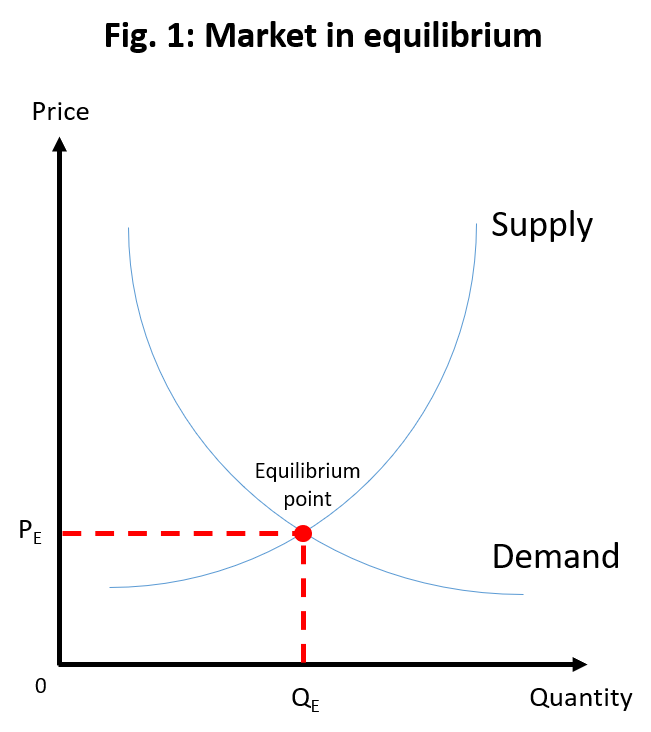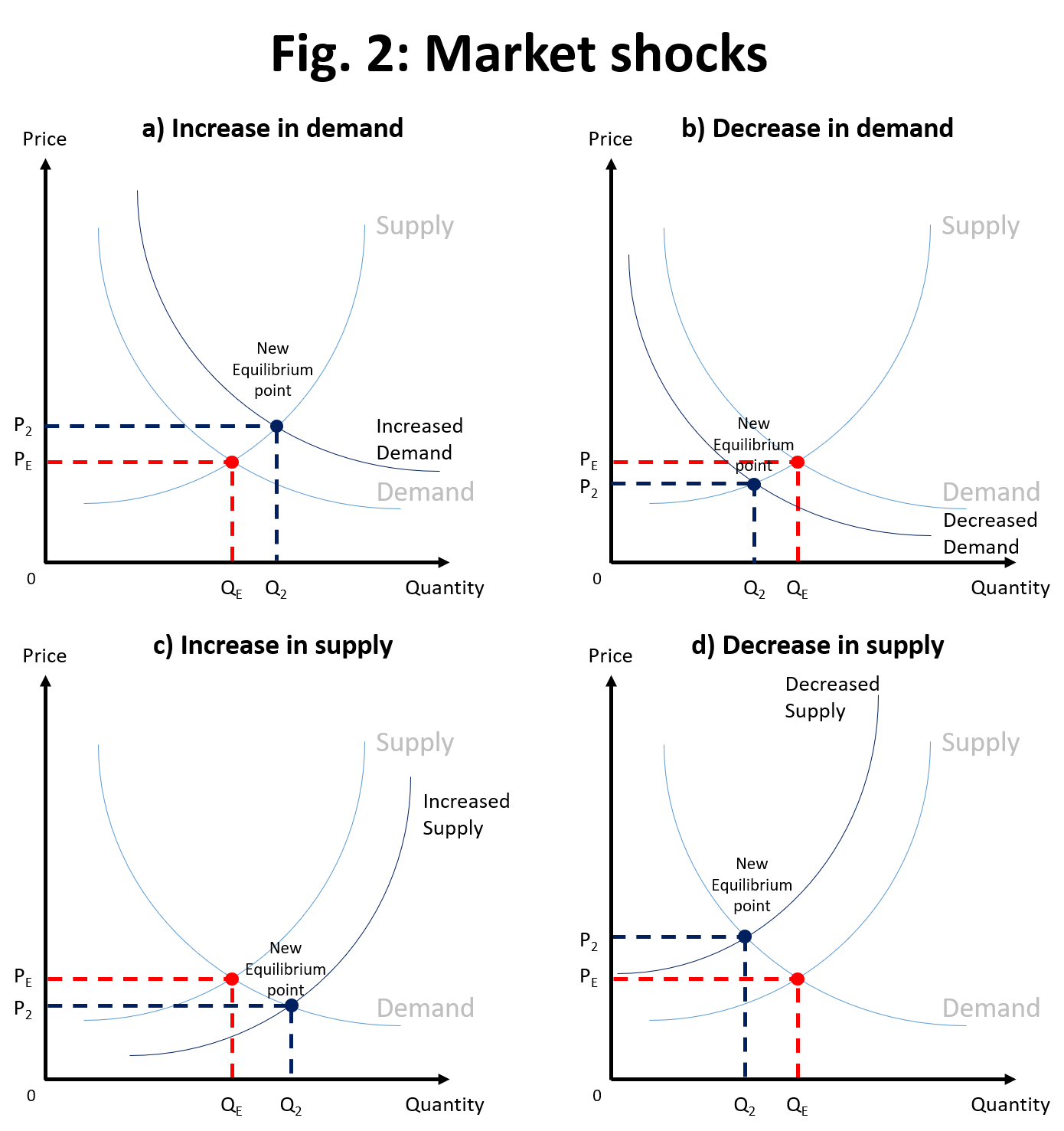By Francisco A. Castellanos-Sosa
07 Sep 16 - 12:00
I am writing this article to express some points on a topic that has been constantly mentioned about a proposal made by Donald Trump, the Republican candidate for the presidency of the United States. His idea is to build a wall on the USA-Mexico border to stop illegal traffic of guns, drugs, and people; and deport illegal immigrants. Nevertheless, some fundamental economic implications are not being explained entirely in the news, which I aim to clarify here.
This work is composed of four sections. First, you will find basic Economics about the demand and supply of normal goods and services. In the second section, I will put on the table some necessary assumptions and implications derived from a simple analysis. In the third section, I tackle the main question and add some proposals. In the end, I present some personal comments.
1. Basic Economics
The demand and supply curves are all the possible demanded or supplied quantities of a particular good or service at different levels of prices. These curves intersect at a point (the equilibrium point), with both unique equilibrium quantity and price (see Figure 1).

Both supply and demand curves can increase or decrease, moving the equilibrium point and the equilibrium quantity and price. All possible individual movements on either demand or supply are shown in Figure 2.

I am going to refer to the previous figures, hereon, when it becomes necessary.
2. Assumptions and analysis
Before starting with the implications of building a wall, it is essential to establish some assumptions.
- All the illegal traffic (guns, drugs, and people) comes from Mexico.
- Building a wall on the USA-Mexico border will completely stop the illegal traffic of guns, drugs, and people.
- Guns, drugs, and people are normal goods.
- There are three moments under analysis:
- Before illegal traffic.
- When there is illegal traffic, and the wall has not been built (now).
- After the proposal has been ultimately achieved (the wall has been built and immigrant workers have been deported).
- The markets at the moment one are at the equilibrium point.
- Immigrants occupy principally jobs that do not require a high level of education.
- We are only talking about national markets of guns, drugs, and people (regional effects do not necessarily follow the same logic).
These assumptions are to simplify the analysis of Trump’s proposal.
We all already know these assumptions are neither entirely true nor entirely false.
Moment 1 in the USA economy
At this moment, markets are in equilibrium. There is no problem to care about.
Moment 2 in the USA economy
The supply of guns, drugs, and people increases in their respective markets (see Fig. 2c). Therefore, the first overall effect is that under the presence of illegal traffic without having built the wall, there will be a lower equilibrium price and a higher quantity at each market. In other words:
- Guns are going to be cheaper since there are more guns available.
- Drugs are going to be cheaper since there are more drugs available.
- The labor force is going to be paid lower wages since there are more people able to work.
Yes, the pattern is easy to be followed.
Subsequently, some fundamental issues may arise:
- Security problems are more likely to increase since there are more guns out there.
- Drug abuse and health problems are more likely to occur because of the more accessible access to drugs.
- Part of the low-skilled workers in the USA would be displaced by immigrant people since the latter ones can work for a lower average wage due to their immigrant status and no-taxable status (see Fig. 2c).
- The production levels of products in which immigrants were hired increased because of the lower wages paid to immigrants (also see Fig. 2c).
- The price of those basic goods consumed by the new people in the economy will rise because of its new and higher demand (see Fig. 2a).
Moment 3 in the USA economy
After the wall has been built, there is no illegal traffic of guns, drugs, and people, and immigrants have been deported. Thus, the supply of guns, drug, and people decreases on their respective markets (see Fig. 2d). The first overall effect is that in the absence of illegal traffic the price of the product in which illegal immigrant people were hired are going to increase (and the price of other goods since some of these products are input in the production of others) and a lower quantity of each of them is going to be available. In other words:
- Guns are going to be more expensive since there are fewer guns available.
- Drugs are going to be more expensive since there are fewer drugs available.
- Labor force is going to be paid higher wages since there is less labor force able to work.
Subsequently, some fundamental issues may directly arise:
- Security problems are more likely to be reduced since fewer guns are available for crimes.
- Drug abuse and health problems are less likely to occur because of the more difficult access to drugs.
- Part of the USA's low-skilled workers would take immigrants' jobs. These legal jobs will require higher wages (see Fig. 2d) since fewer people are available to work.
- The production levels of all the products in which immigrants used to be hired decreased because of the increase in the average cost (by paying higher wages when hiring USA citizens) (see Fig. 2d).
- The price of the products of the industries in which immigrants used to work before deportation will increase since now costs are higher (due to higher legal wages) (see Fig. 2d).
- The price of those basic goods that were consumed by the new people in the economy will decrease because of the new reduced demand (see Fig. 2b).
3. What’s behind Trump's proposal for US citizens?
Regardless of the "obvious" benefits that a wall on the USA-Mexico border and deporting people may “give” to the US economy, there are some relevant points that need to be taken into consideration seriously.
- The proposal promotes more low-skilled jobs with higher immigrant salaries: Yes, after building a wall, it will be more employment for US citizens. Jobs with a higher salary than that of the immigrants. Neither dream jobs nor outstanding salaries, but those occupied by immigrants with a bit of extra wage to cover taxes are going to be created. Many USA citizens are going to benefit from low-skilled jobs (those occupied by most illegal immigrants), and they are going to ask for a higher salary.
- Higher production costs and higher prices: Despite the increased demand for basic goods consumed by the new people; due to the higher salaries, the costs of production are going to grow, and this situation is going to decrease the supply of the final goods or services (see Fig. 2d). A problem that leads to an increase in the price of final goods and services. This effect is present in specific markets and in all those in which the goods or services are part of the production chain. All consumers of goods and services of the industries in which immigrants worked directly or indirectly will be affected.
- Many firms in the USA will close: Many firms are more likely to close because of the lack of labor force able to work for low wages. Yes, low-skilled US citizens are going to obtain jobs, but, on the other hand, there is going to be a lack of labor force because of the massive deportation proposed by Trump. Many firm owners are going to be affected by either moving their business to another place or changing to other industries. This could also affect other sectors because of the new competitors.
- The USA will need to import more products, and it is going to be at higher prices: The price of the products would be that high that it will be worthwhile for the USA to import, at higher prices, the low-price products that the USA's industry used to import before the wall was built. This is because now the American industry will not produce at the same level of low costs and low prices.
- The reduction of available income to invest or the increase of taxes: The cost of paying for a wall (including the extra ten ft. Trump added some days ago) will become from USA resources since Mexico is not forced to pay for it. Where will the USA obtain that money? Obviously from the USA taxpayers or by reducing the public investment in other areas. Taxpayers are going to be seriously affected.
- “Trade War”: Trying to force Mexico to pay for the wall could end in the breaking of many trade agreements between both countries. Therefore, the USA would need to produce such products at higher prices or import them at a higher price than the one obtained with the former trade agreement. The prices are going to increase and affect USA consumers.
To wall? I don’t think it is a good idea.
If what the US people want is to reduce problems related to employment and national security, then the wall proposal of the Republican candidate is not the best call. Otherwise, if more jobs and security are wanted, I present some general recommendations to make America (the continent, not the country) great.
- Make the USA-Mexico border an International Economic Zone: A zone in which both Mexican and USA citizens could work without any legal problem. In this way, there will be more employment, and of higher quality, in a specific geographical area, with economic benefits for both nations. The main idea is to establish an area in which unemployed USA people and unemployed Mexican people could have quality jobs at the same time. This could be the most prominent international industry area globally and a big target to international investors.
- Ally Homeland Security departments: Putting forces together will lead to higher levels of intelligence and increase the ability to block the traffic of drugs and guns. In this way, both countries will be able to make a complete following process to the already initiated investigations; block the traffic in strategically previously identified areas, and implement international security programs for both.
4. Personal comments
The fact that Trump offends and generalizes negative aspects of Mexican people does not offend me. I know that all countries have these problems and that he is just trying to call the attention of the media and news. He knows he can win the elections with votes. Then, he is trying to gain the electorate’s preference regardless of his jargon and unsound proposals.
We live in democratic countries, and we must focus our votes on the soundness of the proposals presented during the candidates' campaigns. Specifically, we should analyze the quality of candidates' proposals and vote for the candidate with the most beneficial plan for the country and us.
Being a president is not a position of absolute power. Presidents need to work as a team with congress, other ministries, and other countries. Then, it is just a matter of logic that there are many benefits of having good national and international relationships. And, overall, it is a matter of common sense that dialogue and peace should guide candidates’ speeches.
I appreciate the time you spent reading this since it is the first article on my blog. Please do not hesitate to share your thoughts with me.

